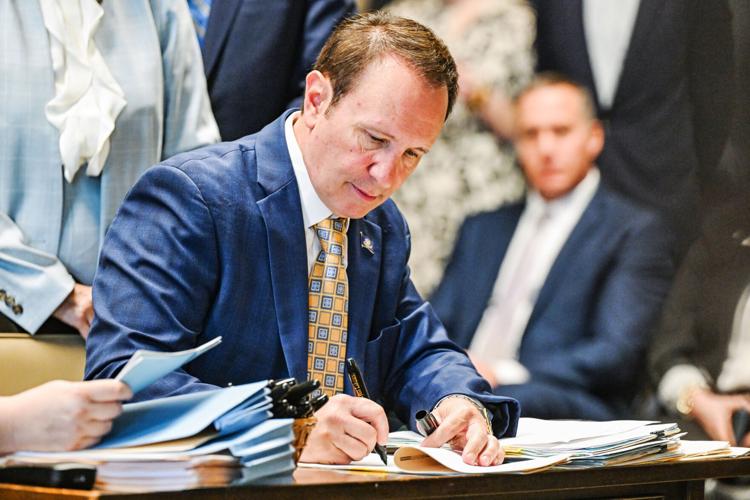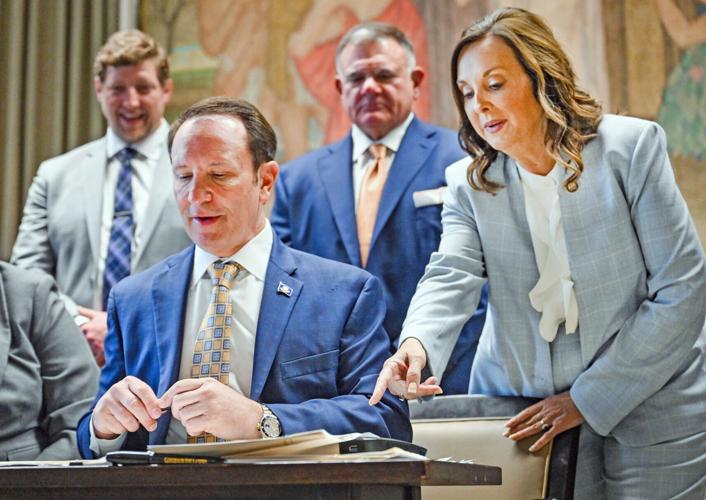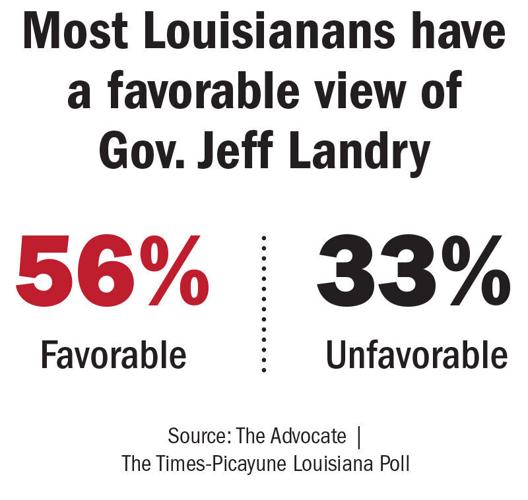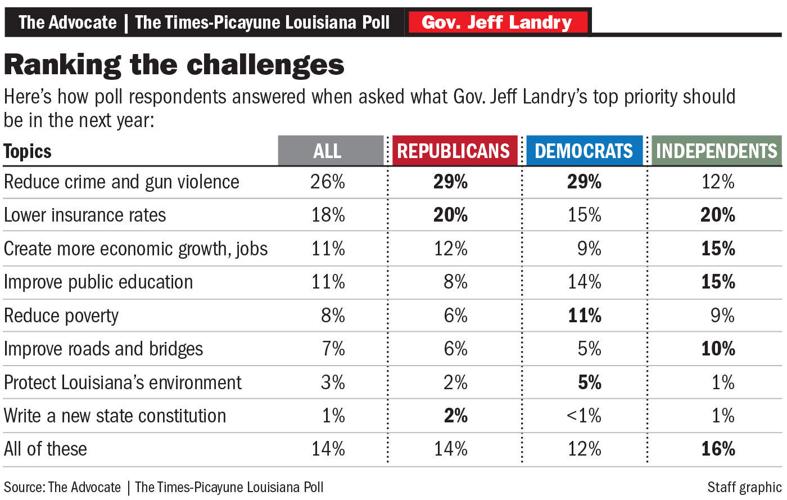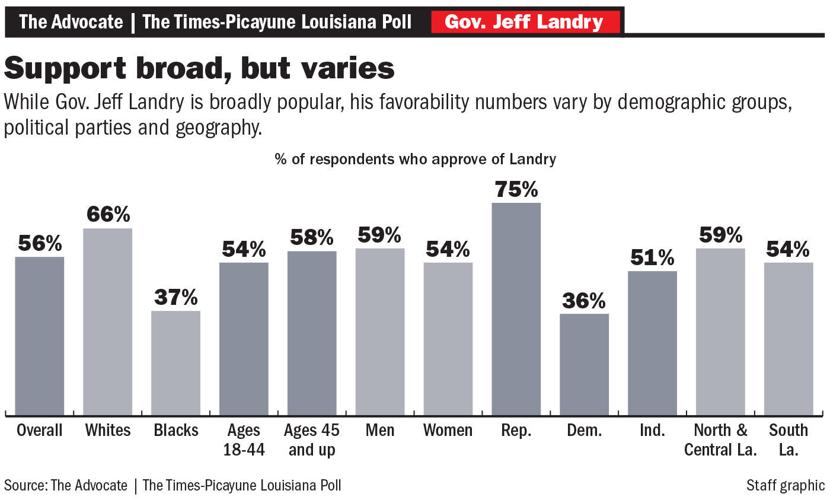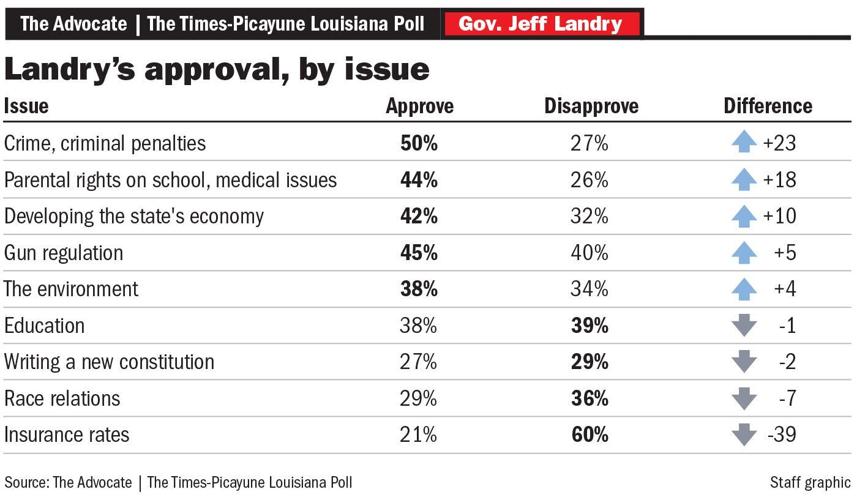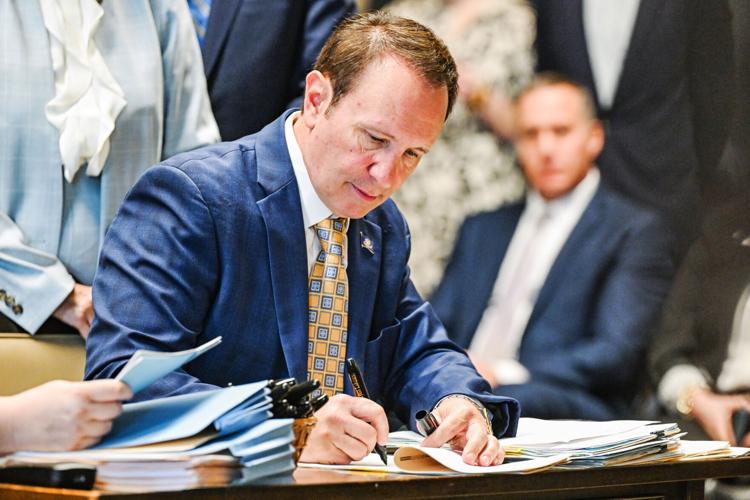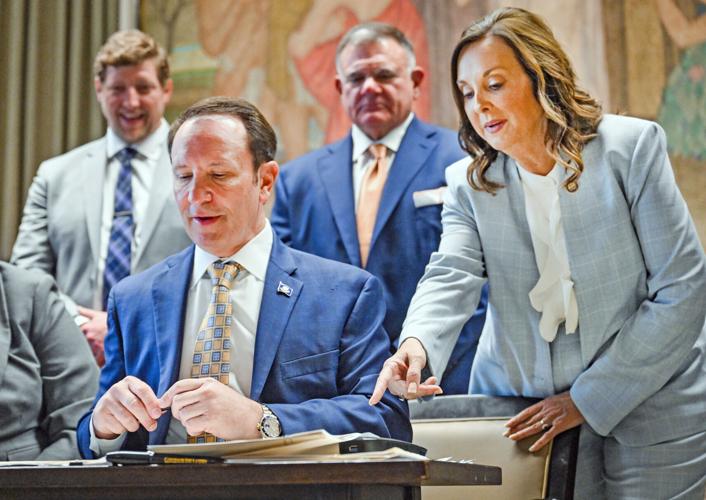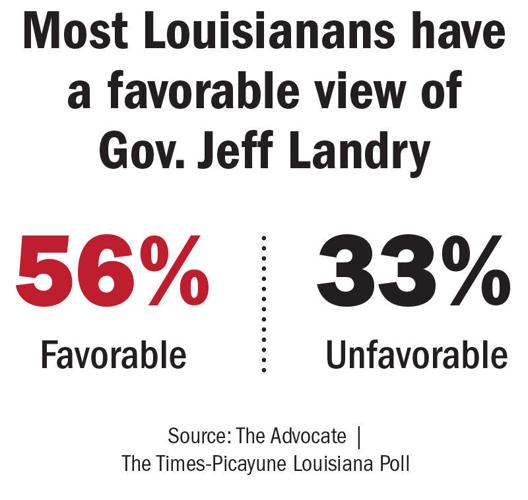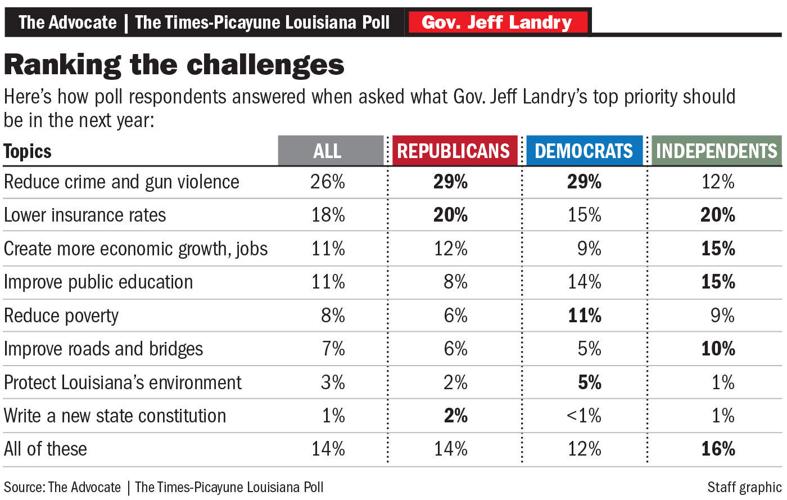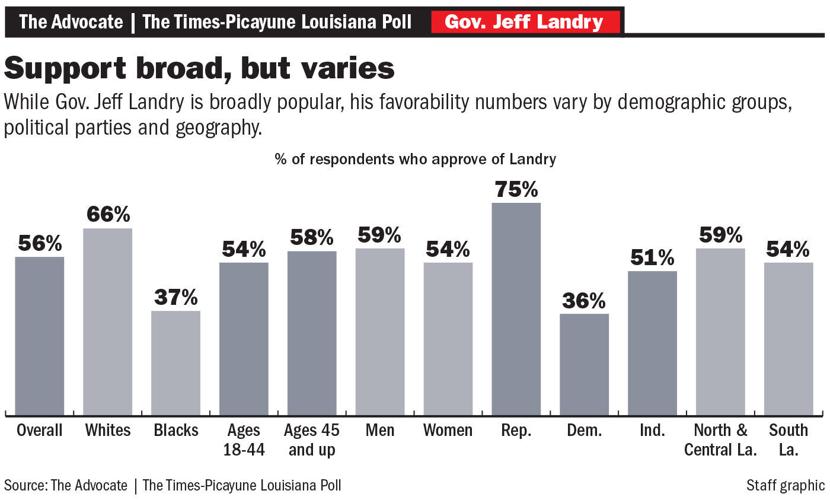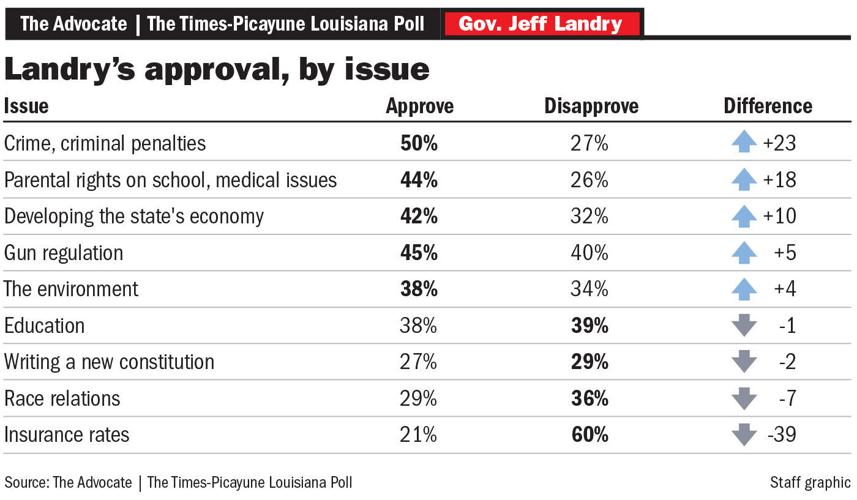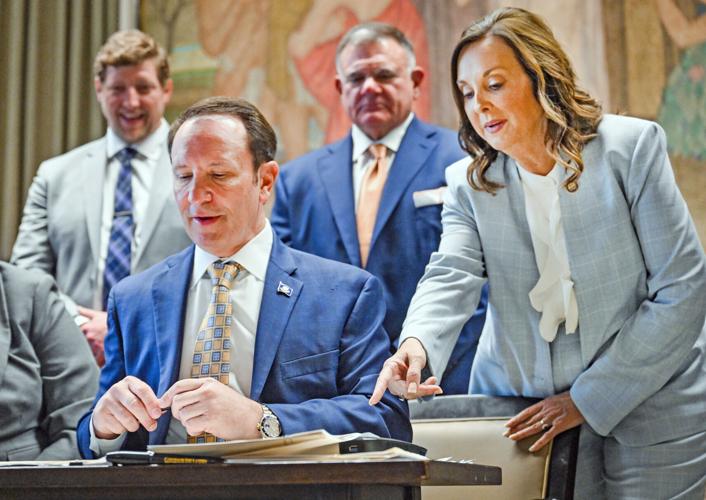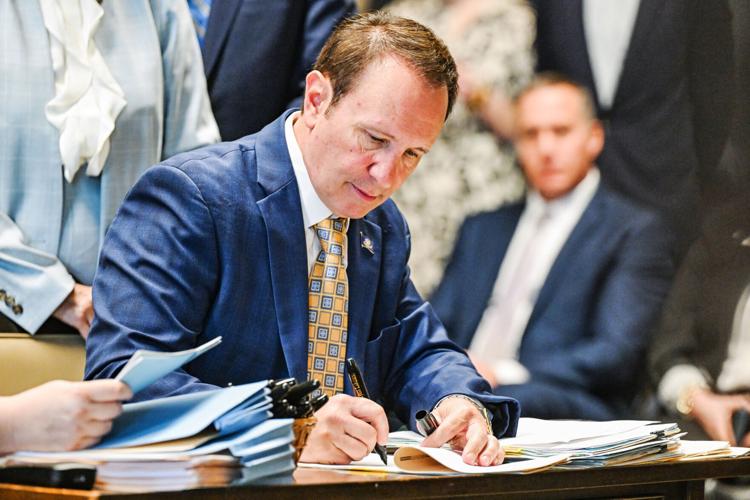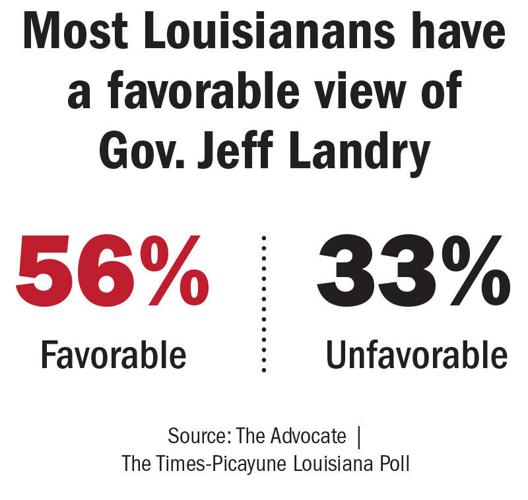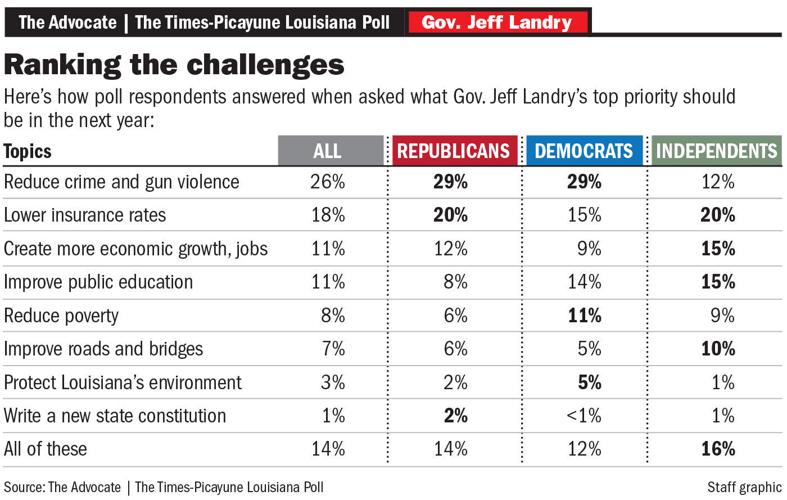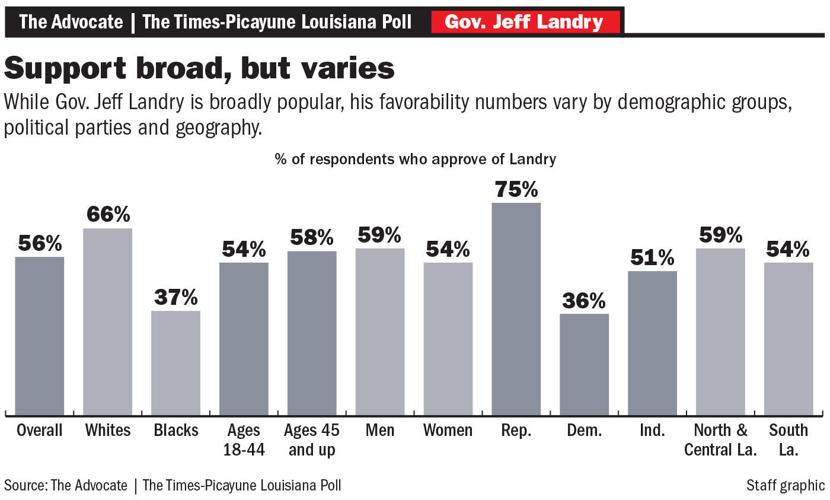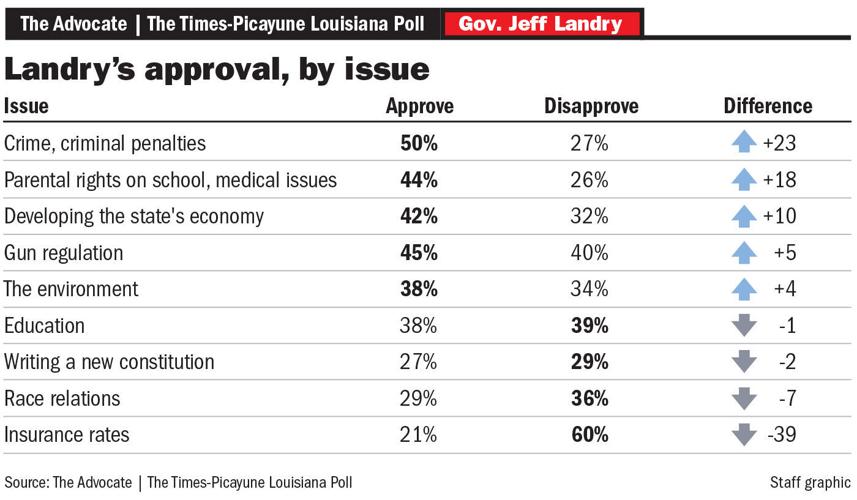Gov. Jeff Landry is enjoying a political honeymoon with Louisiana voters after 100 days in office, with strong public backing for his conservative positions on crime and education, according to a statewide poll conducted for The Times-Picayune | The Advocate.

Voters gave the governor a 56% favorable rating overall during the April 22-26 poll, driven by their support for his tough-on-crime agenda and his push for parental rights on school and medical issues. Landry’s unfavorable rating was only 33%. The poll surveyed 800 voters around the state, predominantly by cell phone, and has a margin of error of 3.5%.
Ron Faucheux, a veteran New Orleans-based pollster who conducted the survey for the Times-Picayune | The Advocate, said Landry can take satisfaction in being slightly more popular now than when he was elected in October with 51.5% of the vote.
But Faucheux noted that the poll contains a flashing warning signal for the new governor: Only 21% of voters approved of how he’s tackling the rise in insurance rates, while 60% disapprove.
“The insurance issue does not currently appear to be hurting Landry’s overall rating, but over time if voters continue to be dissatisfied with state government’s response to the problem, it could become very harmful to him,” Faucheux said.
With the rising cost of insurance, Landry has inherited a problem of major concern throughout Louisiana but especially in coastal parishes that are most vulnerable to hurricanes. It’s the second most important issue for voters after crime, the poll showed.

The governor has let Insurance Commissioner Tim Temple take the lead on insurance issues with proposals to deregulate the industry. Temple believes that this approach will encourage more companies to write policies in Louisiana, which in turn will reduce rates or at least stem the increases.
“Commissioner Temple believes, and I agree with him, that the deregulatory measures he is undertaking will improve market conditions,” Landry told legislators when he opened the regular session on March 11.
Not surprisingly, Landry received an 80% favorable rating from rock-solid Republican supporters of former President Donald Trump, who endorsed him last year, according to the poll.
The governor’s favorable rating dropped off among less-reliable Trump Republicans (63%), Democrats (36%) and Black voters (37%). Faucheux said Landry's support among Black voters was "an impressive showing" for a conservative Republican governor, though he noted that some other GOP governors have similar support.
Joshua Broussard, a health care worker from Lafayette who took part in the poll and agreed to an interview afterward, said Landry is "doing the best that he can be doing."
"I know that he just got into office. I'm going to give him a chance," Broussard said, adding that he mostly favors Landry's tough-on-crime agenda.
Christopher Van Hise, a primary care physician in New Orleans who was also polled, expressed concern that Landry’s desire to have fewer people on Medicaid could lead to moves to take them off the federal health program for the poor.
If that happened, Van Hise said, “I’m concerned that my patients won’t be able to afford their prescriptions and not be able to see their doctors and will miss important cancer screenings. Rolling back on that is moving in the wrong direction.”

Tough on crime
Landry won the governor’s race outright in the October primary by almost exclusively focusing on his pledge to make Louisiana safer by cracking down on crime.
Since taking office in January, Landry has moved aggressively on many fronts to enact his proposals and expand his already considerable power, backed by a two-thirds Republican majority in the Legislature. “I don’t move slow,” Landry told The Times-Picayune | The Advocate a month ago, in a comment that for many encapsulates his approach to governing.
About 57% of voters believe that Landry is moving at the right speed to get things done or is not moving fast enough.
The poll showed that 39% of voters believe he is moving too fast, which is a common complaint by Democrats and progressive groups.
In a special session he called in January, Landry got legislators to redraw the boundaries of the six-member congressional delegation by creating a second Black-majority district that favors a sometime-ally, state Sen. Cleo Fields, D-Baton Rouge, at the expense of Graves, a Republican who backed Landry’s biggest Republican opponent last year. (A federal court panel overturned that decision on Tuesday, leaving the congressional boundaries up in the air.)
The governor followed up by calling a special session in February and getting the Legislature to pass his entire 20-bill package.
Those bills eliminate parole for all adults who commit crimes, make it easier to resume executing inmates on death row, make it harder for prisoners to win early release for good behavior, place 17-year-olds in the harsher adult justice system and make a number of youth court records available to the public — all in the name of making Louisiana safer.
The Legislature took those votes even though major crimes are dropping in New Orleans, Baton Rouge and other cities, and Louisiana already has one of the highest incarceration rates in the country per capita.
“In 2021 Louisiana had the highest violent crime rate in the nation,” Landry told legislators in February when he opened that special session. “In 2022, three of our cities were in the top 10 most dangerous cities in America. 280 people were murdered that year in New Orleans alone, earning that city the title of ‘murder capital’ of the country.”
One of the measures that passed in February — which beginning July 4 will allow people to carry a concealed gun without obtaining a Louisiana State Police permit — prompts Robert Hidalgo to give Landry a thumbs up.
“He’s giving us back our guns,” said Hidalgo, a 60-year-old Opelousas resident. “We’ll have our guns, just like the criminals have their guns, to defend ourselves.”
The poll showed that 50% of voters support his plans for crime and criminal penalties, while only 27% disapprove, a 23% margin that is greater than on any of nine issues.

Landry on other issues
Landry enjoyed an 18% approval margin on his support for parental rights on school and medical issues and a 10% margin on developing the state economy.
The governor had slightly favorable ratings on gun regulation and the environment and slightly negative ratings on education, his handling of a proposed rewrite of the state’s constitution and on race relations.
Black voters especially take a dim view of his approach to race relations, with 61% having an unfavorable opinion.
While Landry appears to be off to a good start with voters, the history of recent governors shows that this provides no clear indication of whether he would win reelection for a second term.
Landry’s standing with voters is lower than support for then-Gov. Bobby Jindal at a similar point in 2008 just after taking office when Jindal enjoyed a 77% favorable rating, according to a poll by Southern Media & Opinion Research, a Baton Rouge-based firm. Jindal went on to win reelection in 2011 but left office deeply unpopular because of his budget cuts and focus on running for president.
Then-Gov. Mike Foster in 1996 had a 56% approval rating in March 1996, two months after taking office, according to the polling firm. Foster easily won reelection in 1999 and left office very popular.
Then-Gov. Kathleen Blanco had a 59% approval rating in March 2004, two months after taking office but didn’t run for reelection in 2007, after her handling of Hurricane Katrina destroyed her popularity.
Then-Gov. John Bel Edwards earned only a 42% job approval rating in February 2016, a month after taking office, when he was getting the Legislature to approve a 1-cent increase in the state sales tax to close a $2 billion budget gap inherited from Jindal. He rebuilt his popularity and narrowly won reelection in 2019.
Read next: Louisiana voters don't care about rewriting state's constitution, poll shows. Here's why.
Read next: Jeff Landry, Louisiana lawmakers went too far on permitless concealed carry, poll shows
How the poll was conducted
Faucheux Strategies, a nonpartisan research firm based in Louisiana, interviewed a representative sample of 800 registered voters across Louisiana between April 22-26.
Trained professionals conducted the interviews by telephone; 79% of them were contacted on cell phones and 21% on landlines.
The calls were based on a scientifically selected, random sample of state voters. The racial composition of the sample was 64% White, 30% Black and 6% other. For this poll, “independent” includes people who have no party affiliation and people who are affiliated with a third party. The poll’s margin of error is +/- 3.46%.


